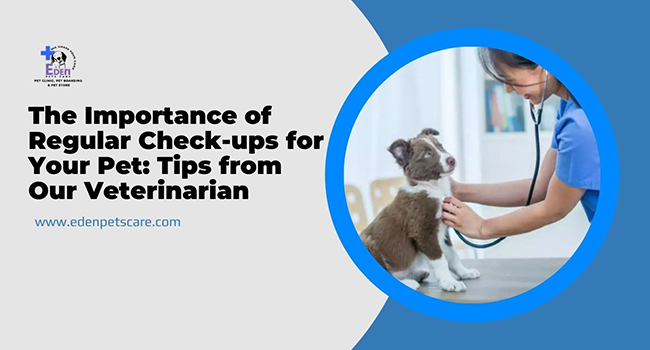

As pet owners, we want our furry friends to live long, happy, and healthy lives. One of the most important ways we can help ensure this is by scheduling regular check-ups with a veterinarian.
Just like humans, pets require routine medical care to maintain their health and well-being. But how often should your pet have a check-up, and what can you expect during the appointment?
Regular check-ups with a veterinarian play a crucial role in maintaining your pet's health. During a check-up, the veterinarian will perform a thorough physical exam to assess your pet's overall health, and may also recommend additional tests or procedures based on your pet's age, breed, and medical history.
Some of the key roles of check-ups in maintaining pet health include:
Just like with humans, many health problems in pets can be easier to treat when caught early.
During a check-up, the veterinarian will look for any signs of illness or disease, including changes in weight, mobility, appetite, and behavior. By catching health issues early, your pet may be able to receive treatment before the condition worsens.
In addition to detecting existing health issues, regular check-ups can also help prevent future health problems.
The veterinarian may recommend preventative measures such as vaccinations, parasite prevention, and dental care to help keep your pet healthy and prevent disease.
No two pets are exactly alike, and during a check-up, the veterinarian can assess your pet's individual needs and provide personalized care. For example, an older pet may need more frequent check-ups and additional testing to monitor for age-related health issues.
By providing personalized care, the veterinarian can help keep your pet healthy and happy for years to come.
Overall, regular check-ups are an essential part of maintaining your pet's health. By detecting and preventing health issues and providing personalized care, a veterinarian can help your pet live a long and healthy life.
The frequency of check-ups for pets can vary depending on factors such as age, breed, and medical history. In general, it is recommended that adult pets have a check-up at least once a year.
Puppies, kittens, and senior pets may require more frequent check-ups. Here are some general guidelines for how often your pet should have a check-up:
Puppies and kittens should have a check-up with a veterinarian at least once every three to four weeks until they are about 16 weeks old.
During this time, they will need vaccinations and deworming, and the veterinarian will monitor their growth and development.
Adult pets (ages 1-7) should have a check-up with a veterinarian at least once a year.
During this time, the veterinarian will assess the pet's overall health, perform any necessary vaccinations or parasite prevention, and check for any signs of illness.
Senior pets (ages 7 and up) should have a check-up with a veterinarian at least twice a year. During this time, the veterinarian will perform a thorough physical exam and may recommend additional testing such as bloodwork to monitor for age-related health issues.
It's important to note that some pets may require more frequent check-ups depending on their medical history or any ongoing health issues.
Additionally, if you notice any changes in your pet's behavior, appetite, or mobility, it's important to schedule a check-up with a veterinarian as soon as possible. By staying on top of your pet's medical care, you can help ensure they stay healthy and happy for years to come.
If you've never taken your pet to the veterinarian for a check-up before, you may be wondering what to expect during the appointment.
Here are some of the things you can expect during a check-up with a veterinarian:
The veterinarian will perform a thorough physical exam to assess your pet's overall health.
This may include checking your pet's eyes, ears, mouth, teeth, skin, coat, and weight. The veterinarian will also listen to your pet's heart and lungs, and may perform other tests as needed.
Depending on your pet's age and medical history, the veterinarian may administer vaccinations to protect against common diseases such as rabies, distemper, and parvovirus. It's important to keep your pet up-to-date on vaccinations to protect their health.
The veterinarian may recommend parasite prevention measures such as flea and tick prevention, heartworm prevention, and deworming to help keep your pet healthy and prevent the spread of disease.
Dental care is an important part of maintaining your pet's overall health. The veterinarian may perform a dental exam and recommend preventative measures such as regular teeth cleanings or dental treats to help keep your pet's teeth and gums healthy.
Depending on your pet's medical history or any signs of illness detected during the exam, the veterinarian may recommend additional tests or procedures such as bloodwork, urinalysis, or x-rays to help diagnose and treat any health issues.
Overall, a check-up with a veterinarian is a comprehensive exam that helps ensure your pet's overall health and well-being. By keeping up with regular check-ups, you can help keep your pet healthy and happy for years to come.
In addition to regular check-ups with a veterinarian, there are many things pet owners can do at home to help maintain their pet's health and prevent illness. Here are some tips for preventative care for your pet:
Feeding your pet a well-balanced diet that meets their nutritional needs is an important part of maintaining their health.
Consult with your veterinarian to determine the best diet for your pet based on their age, breed, and any medical conditions they may have.
Regular exercise is important for pets to maintain a healthy weight, promote good circulation, and prevent obesity-related health issues.
Be sure to provide your pet with opportunities for exercise and playtime every day.
Regular grooming such as brushing your pet's coat and teeth can help maintain their overall health and prevent issues such as dental disease and skin infections.
Be sure to follow proper grooming techniques and consult with your veterinarian if you have any questions.
In addition to parasite prevention measures recommended by your veterinarian, you can also help prevent the spread of parasites by regularly cleaning your pet's bedding and living areas, and keeping your yard clean and free of waste.
Paying attention to your pet's behaviour, appetite, and mobility can help detect any signs of illness early on. If you notice any changes in your pet's behaviour, it's important to schedule a check-up with a veterinarian as soon as possible.
By following these preventative care tips at home in addition to regular check-ups with a veterinarian, you can help ensure your pet stays healthy and happy for years to come.
Regular check-ups with a veterinarian and preventative care at home are crucial for maintaining the health and well-being of your pet. By taking a proactive approach to your pet's health, you can help prevent illness and detect any health issues early on.
During a check-up with a veterinarian, you can expect a comprehensive physical exam, vaccinations, parasite prevention measures, dental care, and potentially additional tests or procedures depending on your pet's medical history and needs.
At home, proper nutrition, exercise, grooming, parasite prevention, and observation of your pet's behavior are all important for maintaining their health.
By working together with a veterinarian and practicing good preventative care at home, you can help ensure your pet stays healthy and happy for years to come.